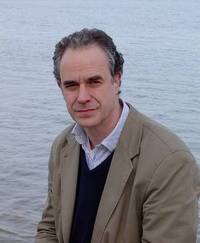Charles Clover
Born
The United Kingdom
More books by Charles Clover…
“Celebrity chefs are the leaders in the field of food, and we are the led. Why should the leaders of chemical businesses be held responsible for polluting the marine environment with a few grams of effluent, which is sublethal to marine species, while celebrity chefs are turning out endangered fish at several dozen tables a night without enduring a syllable of criticism?”
― The End of the Line: How Overfishing Is Changing the World and What We Eat
― The End of the Line: How Overfishing Is Changing the World and What We Eat
“The scariest thing is that nobody seems to be considering the impact on those wild fish of fish farming on the scale that is now being proposed on the coast of Norway or in the open ocean off the United States. Fish farming, even with conventional techniques, changes fish within a few generations from an animal like a wild buffalo or a wildebeest to the equivalent of a domestic cow.
Domesticated salmon, after several generations, are fat, listless things that are good at putting on weight, not swimming up fast-moving rivers. When they get into a river and breed with wild fish, they can damage the wild fish's prospects of surviving to reproduce. When domesticated fish breed with wild fish, studies indicate the breeding success initially goes up, then slumps as the genetically different offspring are far less successful at returning to the river. Many of the salmon in Norwegian rivers, which used to have fine runs of unusually large fish, are now of farmed origin. Domesticated salmon are also prone to potentially lethal diseases, such as infectious salmon anemia, which has meant many thousands have had to be quarantined or killed. They are also prone to the parasite Gyrodactylus salaris, which has meant that whole river systems in Norway have had to be poisoned with the insecticide rotenone and restocked.”
― The End of the Line: How Overfishing Is Changing the World and What We Eat
Domesticated salmon, after several generations, are fat, listless things that are good at putting on weight, not swimming up fast-moving rivers. When they get into a river and breed with wild fish, they can damage the wild fish's prospects of surviving to reproduce. When domesticated fish breed with wild fish, studies indicate the breeding success initially goes up, then slumps as the genetically different offspring are far less successful at returning to the river. Many of the salmon in Norwegian rivers, which used to have fine runs of unusually large fish, are now of farmed origin. Domesticated salmon are also prone to potentially lethal diseases, such as infectious salmon anemia, which has meant many thousands have had to be quarantined or killed. They are also prone to the parasite Gyrodactylus salaris, which has meant that whole river systems in Norway have had to be poisoned with the insecticide rotenone and restocked.”
― The End of the Line: How Overfishing Is Changing the World and What We Eat
“I believe citizens are beginning to realize that their birthright, a healthy ecosystem, has been stolen, and they want it back.”
― The End of the Line: How Overfishing Is Changing the World and What We Eat
― The End of the Line: How Overfishing Is Changing the World and What We Eat
Topics Mentioning This Author
| topics | posts | views | last activity | |
|---|---|---|---|---|
The Next Best Boo...:
 The Last Letter Game
The Last Letter Game
|
2244 | 2344 | May 30, 2013 12:41PM |
Is this you? Let us know. If not, help out and invite Charles to Goodreads.






























